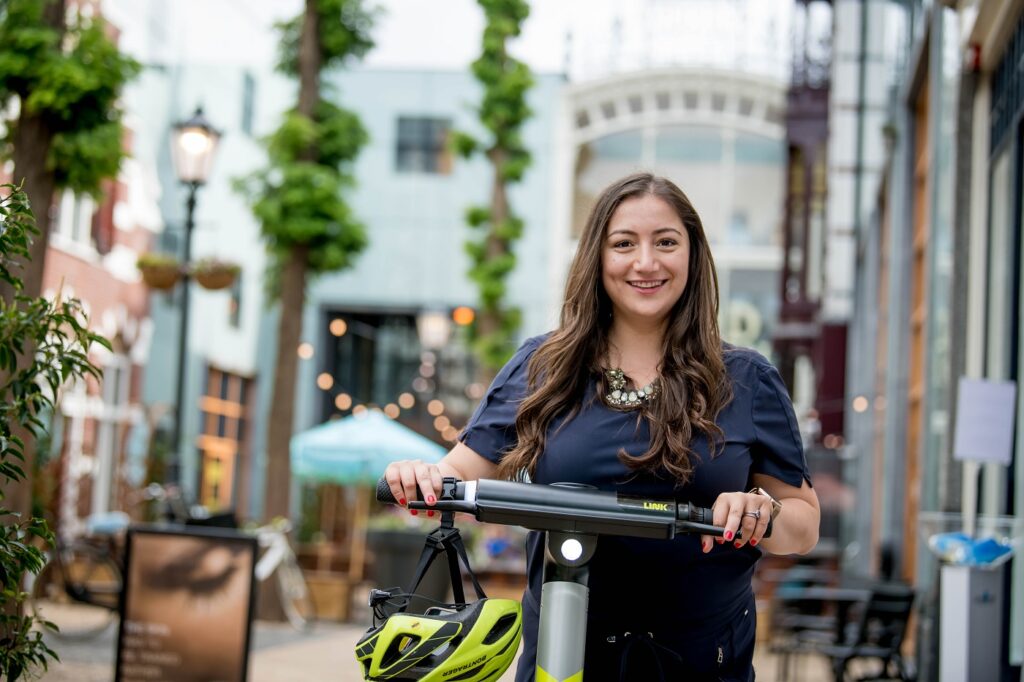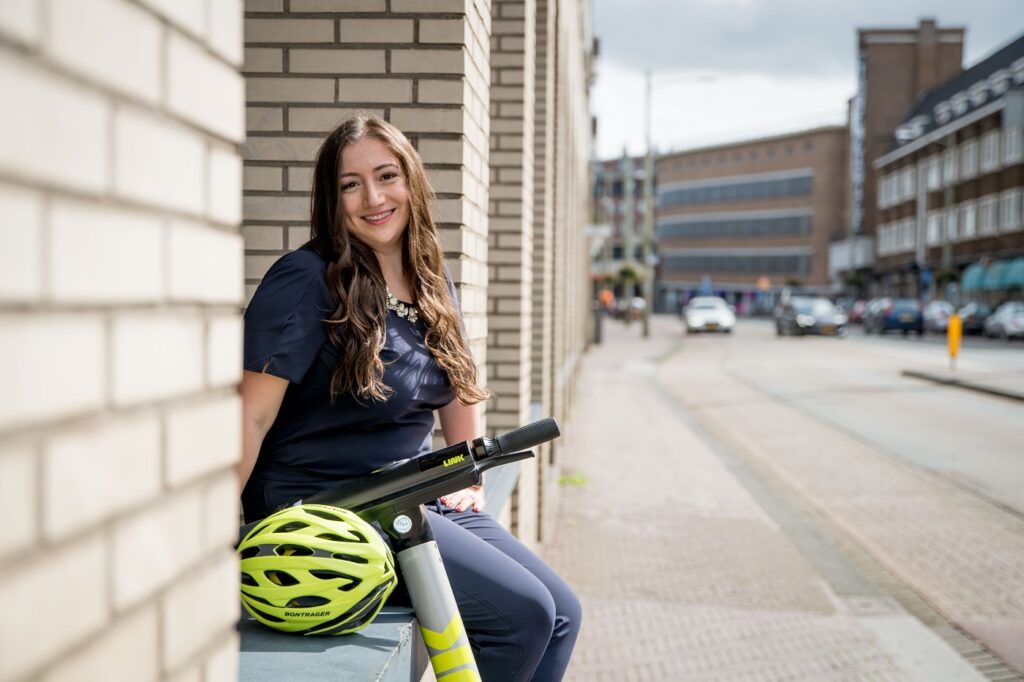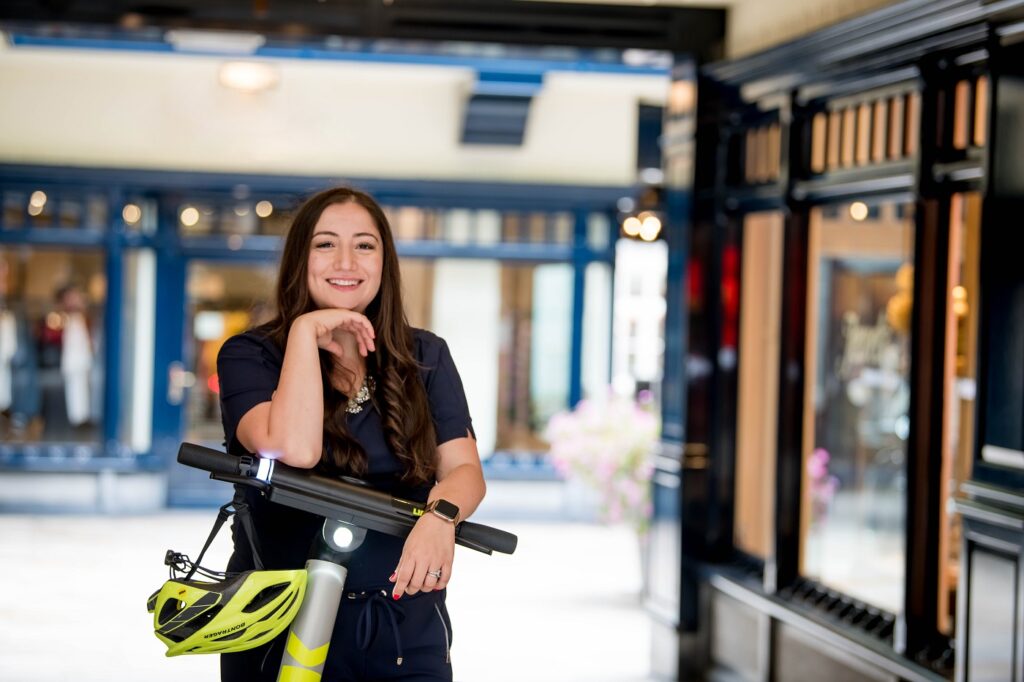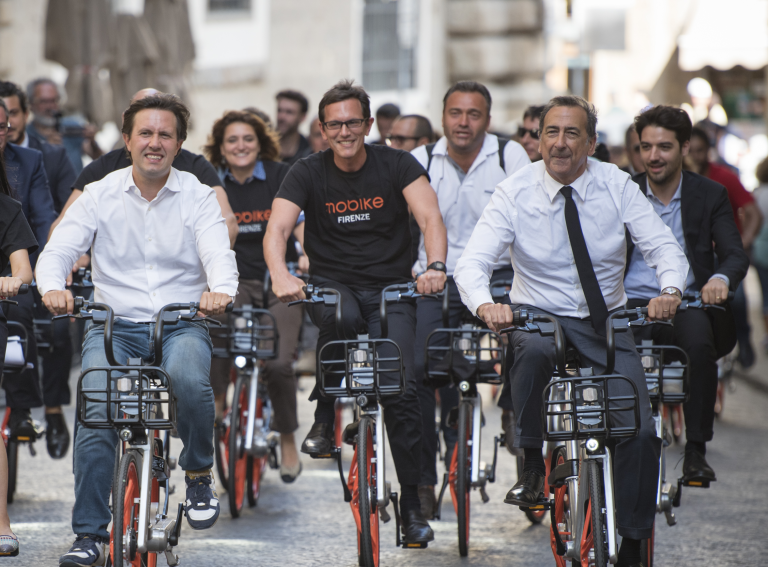Haya Verwoord Douidri talks fast.
Very fast.
Need to make notes as you’re speaking? Forget it. She has a lot to say and eight languages at her command. Her enthusiasm alone could power a fleet of electric scooters. Your job is to keep up.
There’s steely substance behind the machine-gun volley of eager words and friendly tone, though, and a real sense of the mission that pushes her onwards. It’s no whim that has recently taken Verwoord Douidri, 35, from the two-billion-dollar firm Bird (one of micromobility’s founding fathers) to a brand so new the paint has yet to dry on its business cards. She wants to change the way we treat our planet – and she wants to change the way e-scooter companies ply their trade.
“The quality of your life can be very different depending on the quality of the air in the city you live in,” Verwoord Douidri states. She should know: she’s lived in Damascus, Cairo and New York, cities choked by traffic. Her work has taken her to Argentina, Mexico, the Congo, Mozambique and Nigeria. Her travels have taken her further, across Asia. “When you travel so much, you can see a difference in the quality of air. I was always shocked at that cloud you see above cities. I couldn’t imagine breathing that air – and I’ve lived in a lot of busy cities where you don’t have the luxury of great quality air.”
By her late teens, Verwoord Douidri had decided that she was not going to follow her father into law. Business school in Damascus beckoned, but that was a mere stepping stone to Columbia University and a master’s degree in sustainable energy policy.
Verwoord Douidri knew she was not made for office life: “Every time I was offered an opportunity at being at the headquarters of the UN or [for example] going to the Congo for four or five months, I always chose to be in the field. I felt you could do a lot more there.”
Did we mention Verwoord Douidri counts the UN on her CV? And the World Bank?
“The field” is not a euphemism for chaining herself to trees or boats. Verwoord Douidri had already decided that – for her – radical actions weren’t the way to achieve radical goals. Part of her master’s degree covered international conflict resolution, so perhaps an early leaning towards diplomacy was emerging. “I thought there’s a lot more opportunity to change things from the inside,” she explains. “So I didn’t want to work for some activist climate groups.”
Instead, Verwoord Douidri made a move environmentalists would consider a dance with the devil: she went to Shell.
When revolution hovers in the atmosphere like a vapour cloud breathed out on a cold day, two pathways open up. There are those who choose direct action, a spectrum which often includes violence. Then are those who seek to moderate, to sway opinion, to persuade, to rebel peacefully and without destruction. Verwoord Douidri elected to use her words.
When Verwoord Douidri joined Shell, it was to construct an internal voice of reason and steer the company towards a different destiny. “If Shell wants to continue to exist for the next 100 years, we need to be investing in renewables,” her argument to internal teams went. “Not just from an ethical or environmental perspective but from a business perspective.”
Pragmatism colours her approach. Society today runs on energy. People demand it. Economies crave it. “We can’t escape the problem: there is a lot of energy need around the world and that has a cost on the environment,” Doudri notes. “What we can do is reduce that cost, reduce impact to the minimum level, and that’s why I joined the energy industry.”
Verwoord Douidri points out that renewable energy is not an engineering problem, but an economic one: “A lot of infrastructure today is built around oil and gas. It does not mean that we can’t meet the energy demand that we have today through renewables. It just means you need to scale it up and put enough investment into it.”
Altering Shell’s direction, however, turned out to be like trying to turn around the supertankers that carry its products. “Change takes longer because it’s a huge bureaucracy. It’s the same with the UN – I’ve learned that if you don’t have patience, you don’t work for the UN. You need to be in it for the long-term, and you need to be willing to take a lot of no’s before you get one yes.” As an individual, she points out, “it’s a small impact, but together we can make a much bigger impact.”
After eight years (on and off) at Shell, Verwoord Douidri realised the battle for cleaner energy mirrored another global challenge. “Transport is one of the industries that has most of the impact on the environment,” says Verwoord Douidri, “and it’s just like the energy industry, in that we still need to use it every day.”
In 2018, Verwoord Douidri left Shell for the last time and joined a startup that had quickly gained notoriety for its guerrilla-like tactics, its potential to completely up-end our car-centric cultures and its brazen disregard for such niceties as asking permission. Verwoord Douidri joined Bird.
If Shell is like the occupation force, Bird is the band of rebel fighters gleefully blowing up bridges behind enemy lines. The American company suddenly dropped e-scooters onto city streets in 2017 – without warning and without seeking approval from city officials. Unapologetic and unafraid of a fight, the company has expanded behind all comprehension and at breathtaking pace.
“The growth was tremendous,” Verwoord Douidri says of Bird’s surge in the two years she was at the company. “I was heading the government partnership department. When I joined, there were no regulations for e-scooters. It was not even really viewed as a vehicle yet in a lot of countries. One of my achievements was helping to shape that regulatory environment, partnering with governments to put those regulations in place. Now, you see scooters in almost all European cities.”
From August 2018 to June 2020, Bird added 45 European cities to its portfolio, including Rome, Zurich, Madrid, Munich, Stockholm and Paris (although Bird has since left the French capital). Even more impressive was that the black-and-white machines found a home at London’s Olympic Park in 2018, despite e-scooters being illegal to use in public places everywhere else in the country at the time.
Yet, while the appetite of riders and investors swelled to match Bird’s ambitions, legislators remained conservative and safety concerns lingered. “The policy and regulatory end is not always moving at the same pace,” Verwoord Douidri admits. “Business ideas are transforming the way we live and how that impacts how we regulate and how we view regulation – that’s fascinating.”
Bird is one of the dominant forces of the micromobility boom. Its reputation, visibility and operating methods are almost directly responsible for the millions of dollars invested in copycat companies that have sprung up all over the world. When it comes to e-scooter enterprises, Bird has become the establishment.
Meanwhile, in a quiet corner of the US, a company spun out of the prestigious engineering university MIT was busy designing its perfect e-scooter. That firm, Superpedestrian, went on to buy micromobility operator Zagster in 2020. In June, its shared scooter brand Link was born.
Lest you thought Covid wouldn’t get a mention in this story, think again. The pandemic made for a micromobility horror show. As people stopped commuting and travelling, scooter use plummeted. The result was job losses, mergers and operators disappearing. Detractors were gleefully forecasting the end of the entire shared e-scooter concept.
And then, at the height of the maelstrom, Verwoord Douidri decided to leave the relative safety of Bird’s seemingly-bottomless pockets; she moved to Link.
Why?
“The vehicle, the technology, the team – that combination,” she says. “It was the fastest I’ve ever decided. Usually, I’m a very thoughtful person; I would do my excel spreadsheet and rank the companies, but I was sold in less than a week.” Verwoord Douidri took up her post leading Europe and Middle East operations for Link on 1 July 2020.
“We have onboard mapping on the scooter and we don’t need to connect to the cloud, which saves around 30 seconds. That could solve a lot of the issues that other companies are having.”
haya verwoord douidri, link
The jump is not as crazy as it first seems. While Link is a new brand, parent company Superpedestrian has already put in considerable mileage. “The team has spent the last seven years designing vehicle intelligence systems and vehicles in a way that no other company has,” says Verwoord Douidri. “Most companies order scooters off the shelves. If they do design them, they basically pick them from a catalogue, whereas Link is invested in the technology, in solving issues.”
E-scooter operators have faced criticism for fielding vehicles that barely last a few weeks and for not preventing dangerous parking. Verwoord Douidri says Link has taken time to find solutions to these problems before coming to market.
“One of the biggest issues we have with the industry is around safety,” she says. “How do you ensure that a vehicle that is on the road is safe to use? How do you ensure that there is no mechanical failure, there is no electrical failure, there is no issue with the battery or the brakes? The technology that [Link has] invented to make sure that those checks run every second impressed me. That’s why I don’t think an off-the-shelf vehicle is okay for shared use.”
Autonomous testing should allow for reduced maintenance. Link hopes that reduced operating fees will play off against the more expensive vehicle to make for a profitable business.
Link is also very proud of its geofencing technology, which relies less on GPS than industry norms to produce faster response times. “From my experience, one of the biggest concerns that cities have is around street clutter and being able to control what is in their public space,” Verwoord Douidri says. “We have onboard mapping on the scooter and we don’t need to connect to the cloud, which saves around 30 seconds. That could solve a lot of the issues that other companies are having.”
The newcomer differs from its more established competitors in another way. Unlike the industry trend towards swappable batteries, Link’s scooter sticks with building the battery built into the deck. This means that the scooters must be collected for recharging. The company points out in its defence that its scooters are good for 55 miles on a single charge (close to double the sector norm) and that each machine will last 2,500 rides, which it claims is three to five times higher than competitors’.
“Battery lifetime is very important, because that’s the biggest part of the emissions,” says Verwoord Douidri. “If you have swappable batteries and you have three batteries [per scooter] and you have to replace them every few months, it is not more sustainable than having a battery in the vehicle. And that’s why we’ve focused on building a vehicle that has a much longer lifetime.”
Using proprietary technology to disrupt the disruptors is why Verwoord Douidri says: “Link is the Tesla of the micromobility companies.”
Another reason that persuaded Verwoord Douidri to move is, she says, that Link asks first. The company has deliberately styled itself as the opposite of the likes of Uber and Airbnb. “I’m interested in how those companies are changing the way we live,” Verwoord Douidri says, “but I don’t completely agree with their approach. I like the approach we take at Link, which is really collaborative, working with cities, trying to go on that journey together. We’re not going to launch anywhere without approval. Link is in it for the long run.”
As UK trials get underway and e-scooters move into the spotlight perhaps as never before, Link’s Europe policy chief issues an appeal to all operators: “I would call on every other company in the industry to deliver on what you promise. How we do things during this trial will shape the future of micromobility in the UK. We’re all for-profit companies, but we need to take a longer-term approach – rather than ‘profit today and let’s worry about the rest later’ – to have a sustainable business and to offer a sustainable solution to cities.”
Low-level bad behaviour makes headlines when it comes to e-scooters in a way it does not with cars. Verwoord Douidri is aware of the double-standard being applied to the micromobility sector by motorists and cyclists alike: “Is there a bias? Yes, there is a bias. It’s okay to have a little more scrutiny in the beginning, just to make sure that everyone is aware that there are scooters on the road. But we never talk about car accidents. Cars are the most dangerous vehicles on the road but [car collisions don’t] get much media coverage. There is much more scrutiny on everything else. The first [shared] scooter accident in the UK will get probably a lot of coverage.”
This isn’t the only area where Verwoord Douidri thinks e-scooters are unfairly censured: “If we switched all cars to scooters, that would be a net environmental benefit for sure. We have a much higher standard we have to comply with, which is great, but I wish car manufacturers had to comply with the same standards.”
After living in more countries than there are cars parked on pavements, Verwoord Douidri has settled in the Netherlands with husband Aron, stepdaughter Lilyan and five-month-old puppy Sasha.
Living in an area thronged by bicycles used as transport has energised Verwoord Douidri in her mission to drive sustainable travel onwards and, with it, better urban planning that separates motor vehicles from other modes. “It’s unrealistic to expect different vehicles of completely different sizes to be in the same area,” she says. “Segregated bike lanes is what makes it really safe to have more sustainable vehicles – scooters or bikes – and that’s what you see in the Nordics and Amsterdam.”
Electric scooters could play a vital role in harnessing public opinion to persuade politicians and policy-makers to reform city streets into people-first areas. This is the opportunity open to British towns and cities as the government’s scooter trials ramp up over the next 12 months.
In turn, the UK is already exerting its own influence on the micromobility industry. By requiring companies to discuss diversity and inclusivity in tender submissions, scooter startups coming to the UK are having to grapple with societal issues much earlier than elsewhere.
“I’ve been the diversity target for a lot of companies,” says Verwoord Douidri of the attitude at previous employers, “Let’s tick that box. If you make it to the board, we can make our diversity target.”
While she is not claiming that Britain has systemic inequality licked, Verwoord Douidri says of inclusivity here: “In the UK, it’s a very important element. Even in the RFPs [request-for-proposal] and tenders, we’ve been asked about that, which I was very pleasantly impressed with. I haven’t been asked that in a lot of places. I’m hoping to make a lot of investment in scooter education for women in the UK.”
Whether or not Link wins any UK trials, Verwoord Douidri believes that her new company and the wider micromobility industry stand on the brink of transforming our planet for the better by helping to eliminate air pollution and motor vehicle casualties.
“What we are doing is revolutionary,” says Verwoord Douidri. “It could change the way not just a few people move in a city but the way thousands and millions of people are moving around the world.”
For the sake of our planet, we need more people who talk and act as fast as Verwoord Douidri.
–
Prior to publication, Sasha was sadly hit by a car and killed instantly.















